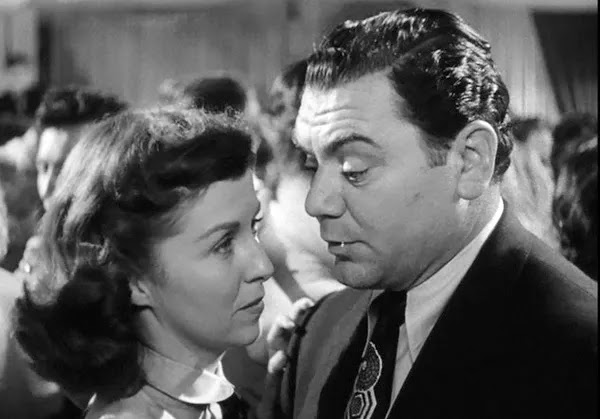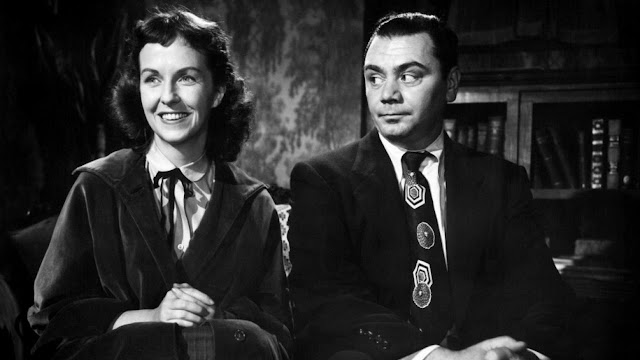In 1953 The Philco-Goodyear Television Playhouse broadcast a one hour romantic drama, originally titled Love Story, about a working class man in his thirties who longs to be married. The teleplay, broadcast live, was retitled Marty after the studio suits pointed out the title was already taken and they didn’t want to battle things out in the courts over the name. Rod Steiger took on the title role and delivered a solid, if unremarkable, performance in the relatively well received show. Shortly afterwards Paddy Chayefsky, screenwriter of the broadcast, was given the opportunity to expand on the premise for a feature film, unaware that the project was being considered for a tax write-off, the project planned to be cancelled mid filming. From the strength of what was already filmed it was allowed to complete the relatively short shooting schedule and debuted at the Cannes film festival where it became the first film to ever win the Palm d’Or. It would eventually become one of only three films to ever win both the Palm d’Or and the Best Picture Oscar, joining the ranks alongside The Lost Weekend and, much later, 2019’s Parasite. Not too shabby for a film made on a shoestring budget and intended to be shelved for the taxes.
When it came time to film the movie version of Marty, Rod Steiger was invited back to reprise his role but the deal fell through thanks to the studio’s insistence he must agree to a seven year contract as part of it. He refused to sign on for that and the role ended up going to relative newcomer Ernest Borgnine who at that time was typecast as brutes and gangsters in no small part due to his role as “Fatso” Judson in From Here to Eternity. Word leaked to the trades that Borgnine was playing the role and it didn’t take long before he was being painted as the brute taking on the role of a softie. For his part Ernest played up the unusual casting and joked about it whenever he was interviewed on the subject.
Starring opposite him was actress Betsy Blair. Betsy, Like Borgnine, considered herself to be not conventionally attractive. She preferred the term “plain” and would correct people who referred to the character as unattractive whenever talking about the role. She had an unconventional beauty to her that worked well in this picture and added to the appeal of her character, especially when paired up with her costar. She was initially blocked from taking the role because of some controversy involving the House Un-American Activities Committee putting her on the Hollywood black list because of some alleged communist sympathies. Her husband at the time, Gene Kelly, went to bat for her, threatening to walk off the production of It’s Always Fair Weather if they didn’t cast her. The threat worked and she was signed on. The casting proved to be inspired and both leads were nominated for Academy Awards with Borgnine winning.
The film follows 34-year-old Marty Piletti (Ernest Borgnine), a butcher living with his mother Teresa (Esther Minciotti) in The Bronx. He’s a good-natured man who is being brow-beaten by his family and friends for still being single. All of his siblings have already settled down, most with children. He wants to be married but finds himself lacking in prospects. He also has a low opinion of himself in no small part due to his stocky build, his age, and his quiet personality. As much as he desires to be married he has resigned himself to bachelorhood.
He is pushed one evening, by his mother, into going to the Stardust Ballroom one Saturday night. While there he meets Clara (Betsy Blair), a plain looking woman five years his junior who was brought to the ballroom as part of a blind group date and found herself deserted by the young man she was to be paired up with. Marty invites her to dance and the two strike up a conversation that continues on to a local diner. The usually quiet Marty finds himself talking excitedly all about himself, his life and his ambitions. He also encourages Clara to follow her own ambitions to take a teaching position upstate that would allow her to move out of her parent’s home and stand on her own feet. At the same time he is considering following his dreams of owning his own butcher shop. He would have to cash in all of his savings and borrow a little to make it happen but he feels confident he could make a go at it.
When he takes Clara to his home he clumsily tries to kiss her but is rebuffed. Clara explains that she didn’t know how to handle the situation and that she does like him which greatly relieves him. Marty tries to hold her, being more gentle and less pushy this time, but they are interrupted by the return home of his mother, who sizes up Clara and immediately decides she doesn’t like the girl. There is a secondary story involving Marty’s aunt having to move in with them when she becomes too much of a burden to her own son and his wife and child. This woman, Aunt Catherine, puts the idea in her sister Teresa’s mind that if Marty should marry the same thing will happen to her. This poisons any chance of her ever warming up to the idea of him getting serious with any girl, let alone Clara. Added to that is Marty’s friends who are also bachelors and spend their evenings wasting time and giving him a hard time about Clara. Their disparaging remarks eventually cause him to not call Clara up when he said he would, leading her to believe he has abandoning her.
At a mere 90 minutes in length, Marty is the shortest film to have won the Best Picture Oscar. It’s also one of the most innocuous films to do so. It’s story about a shy man finding love at a time in his life when he could reasonably expect to remain single forever managed to charm the voters at Cannes and then later at the Academy. It had a simple message about never giving up on your dreams and also that there is someone for everyone really resonated with critics and audiences alike and proved that a movie didn’t need a huge budget with the latest stars of the silver screen to win big. Ernest Borgnine may have been known as a loudmouthed bully or a ruffian but he was perfect playing the self-doubting man who believes there is no one in this world for him. Just watching him first in the opening scene as people try to shame him for being single and then later when he’s finally found a girl who enjoys his company, it is incredible to see the transformation of his character. Later when he’s been convinced by his friends and family not to call her back the look of misery on his face is palpable. You can see it is killing him and that he knows better. It’s nearly impossible not to yell at the screen ‘Get up you lug! Get up and call that girl!” Fortunately he finally realized how stupid he is being and how toxic his friends’ attitudes about women are and he does just that.
Marty may not have the grand scale and grandiose of some of the more famous Best Picture winners but that doesn’t make it any less worthy to be numbered amongst the best of the best. It speaks on self-image, confidence, marriage and happiness, and even a healthy dose of social classism. At 90 minutes it is just as long as it is needed to be and doesn’t feel the need to pad out its running time. The additions to the screenplay missing from the original television broadcast enrich the story and make Marty an even more lovable character without feeling like they are there to expand the story to feature length. Rod Steiger is a great actor but there is no doubt Ernest Borgnine is the definitive Marty, making the character more sympathetic and relatable than Steiger ever did. This is one of those rare examples where the remake outshines the original in every way. Marty is one of those films that you come out of with a smile on your face and a warmth in your heart. The only real weak spot is the rather cheesy theme song that plays over the end credits. “Marty” by Harry Warren is a song that has aged poorly and feels dated and out of place in this otherwise splendid production.
Academy Award Nominations:
Best Motion Picture: Harold Hecht (won)
Best Director: Delbert Mann (won)
Best Actor: Ernest Borgnine (won)
Best Supporting Actor: Joe Mantell
Best Supporting Actress: Betsy Blair
Best Adapted Screenplay: Paddy Chayefsky (won)
Best Art Direction - Black-and-White: Ted Haworth, Walter M. Simonds and Robert Priestley
Best Cinematography - Black-and-White: Joseph LaShelle
____________________________________________________
Release Date: April 11, 1955
Running Time 90 Minutes
Not Rated
Starring: Ernest Borgnine and Betsy Blair
Directed By: Delbert Mann









Comments
Post a Comment